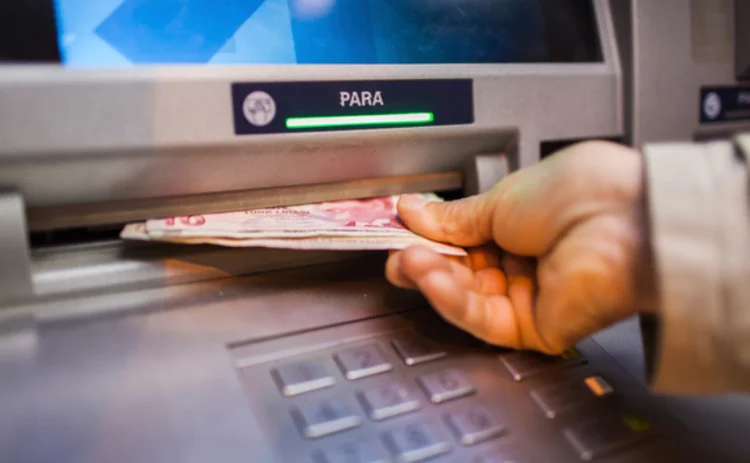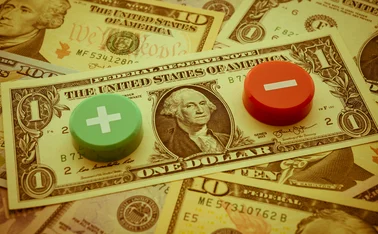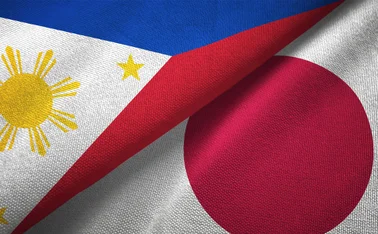
Will cash survive Covid-19?
Fears are emerging that banknotes may carry the coronavirus. Are they justified?

Covid-19 has sparked global panic. Central banks have cut interest rates to near zero, made billions available in liquidity, and urged markets to stay calm.
Meanwhile, leading the public health response has been the World Health Organization, which has been charged with providing governments and members of the public with timely information on the spread and progress of the virus. That has included comments on banknote safety.
At the beginning of March, in response to a question about whether banknotes could spread the coronavirus, a WHO spokesperson said: “Yes it’s possible and it’s a good question. We know that money changes hands frequently and can pick up all sorts of bacteria and viruses … when possible it’s a good idea to use contactless payments”.
Media outlets around the world picked up on the comments, triggering fears over the safety of cash. There have since been reports of people attempting to microwave their banknotes in order to sterilise them.
The WHO has now clarified its comments, stressing it is not advising people to abandon the use of cash. Instead, it is advising the public to wash their hands after handling money, especially before handling or eating food. But the comments have done little to soothe concerns.
So how much will cash usage, and the wider banknote industry, be impacted by coronavirus?
Paper (cotton) vs polymer
In 2015, scientists from the Institute of Genomics and Integrative Biology in New Delhi researched what particles of dirt were evident on different Indian rupee banknotes. The banknotes were collected from street vendors, grocery stores and money exchanges.
Their analysis revealed fungi (70%), bacterial populations (9%) and viruses (<1%) were evident on the banknotes. These were cotton substrate banknotes – known to harbour more bacteria than their polymer counterpoints because they absorb a larger amount of water. While still only minimal, the water allows the bacteria to survive for longer on a banknote.
“Once withdrawn from the bank, [a banknote] can pick up bacteria or viruses from every party that it comes into contact with,” a spokesperson from the Monetary Authority of Singapore tells Central Banking. “This is similar to other common surfaces, such as elevator buttons and handrails.”
Polymer banknotes also have the potential to transmit bacteria from one party to another, but on a much smaller scale. According to scientists at the Harper Adams University, bacteria found on human hands are less capable of sticking to plastic banknotes compared with cotton substrates.
“In addition, bacteria found on human hands die off faster when on plastic banknotes,” explains professor Frank Vriesekoop, who led the research.
Survival time
On March 16, the South African Reserve Bank stated there was no evidence to suggest Covid-19 is transmitted through the use of banknotes.
Gary McLean, a professor of molecular immunology at London Metropolitan University, says: “The virus will not survive on cash for the length of time certain bacteria can, and will still require hand-to-face contact, minimising the transmission chances. There are no scientific studies demonstrating the coronavirus on cash, nor if it can be transmitted in that way.”
The consensus from academics and medical professionals currently regarding how long the virus stays active on a surface depends a lot on the type of surface. On hard surfaces, the virus is likely to last around 48 hours. On soft surfaces, like clothes, it may survive far less. Stephanie Brickman from the WHO says “the virus will not survive for very long on surfaces, particularly on a dry surface like a banknote”.
A study released on March 17, 2020 revealed the current strain of coronavirus was more “stable” on plastic and metals than on softer fabrics including cardboard. This would suggest that while polymer notes are less likely to harbour bacteria, viruses live longer on them.
However, the coronavirus would therefore also live longer on debit and credit cards, and mobile phones, which are being encouraged as payment option by many of the world’s central banks. “Cash is just one of a number of frequently touched surfaces we encounter. The same is true for any other payment device whether it’s a card, phone or watch,” says Reserve Bank of New Zealand assistant governor, Christian Hawkesby.
There are some strains of coronavirus that are a little more persistent. A study in the the Journal of Hospital Infection1 finds coronaviruses persisting on paper and polymer surfaces for up to five days. Another study, by Vincent Munster and a team at the National Institute of Health Virology Laboratory in Hamilton, has them lasting as long as three days on plastic.
But these results are not directly comparable to polymer and cotton banknote substrates.
“It is certainly possible that coronavirus could be present on cash and be transmissible, but I would expect that to be a very minor proportion of transmissions,” McLean says. Simply touching an infected surface will not give someone Covid-19, however; it will still need to be passed to your mouth, nose or eyes.
A 2014 Europe-wide Mastercard study found two-thirds of people think touching or using money is unhygienic, but only one in five Europeans wash their hands after coming into contact with it. More than 9,000 consumers from 12 countries were surveyed.
So while banknotes could increase the reach of Covid-19 (as could payment cards and mobile phones), it is unlikely to increase the transmission if people continue to abide by suggested hygiene standards. “This reinforces the need for good hand hygiene regardless of the way you pay or accept payment,” says Hawkesby.
The risk of banknotes spreading the coronavirus is small “unless someone is using a banknote to sneeze in”, says Christine Tait-Burkard, an expert on infection and immunity at the Roslin Institute at the University of Edinburgh.
Central bank action
Despite the scientific evidence, negative sentiment surrounding coronavirus and cash has persisted. In South Korea, a man was found to have microwaved 1.8 million won ($1,500) in an attempt to sanitise the banknotes. He was left with only 950,000 won after his attempt – many notes were left singed and unusable.
So what can central banks do to calm the public and ensure all payment channels remain open? In Singapore, the Monetary Authority of Singapore is advising members of the public to use contactless payments where possible, and to wash their hands after handling cash.
“People should wash their hands with soap and water after handling cash, and avoid touching their faces with their hands. These are good habits to practise, whether or not there is Covid-19,” a spokesperson from the MAS tells Central Banking. There has also not been increased demand for new banknotes in Singapore, Central Banking understands.
In addition to encouraging electronic methods of payment, central banks have implemented somewhat extreme measures to restore confidence in banknotes and coins.
In China, where Central Banking understands there has been an increased demand for disinfected cash, the People’s Bank of China has implemented a disinfectant regime which exposes banknotes to UV light and high temperatures in order to sterilise banknotes.
The China Banknote Printing and Minting Corporation says it has not been asked to print new banknotes. The only exception has been for hospitals, which have demanded new bills, Central Banking understands.
Similarly, the Bank of Korea is ensuring banknotes coming out of circulation are superheated to 150oC before they re-enter the economy. The Central Bank of Hungary is quarantining banknotes for 14 days prior to sending them through a tunnel heated up to 170oC.
“All banknotes returned to the vaults of the note-issuing banks will be sorted by machines automatically under a stringent standard, with filthy or unfit notes destroyed immediately,” a spokesperson from the Hong Kong Monetary Authority tells Central Banking.
“To prevent the spread of the virus, members of the public should follow the advice of the health authorities to maintain good personal hygiene, such as washing hands properly and frequently,” the spokesperson adds.
Expert advice
Central banks have also sought advice from their banknote suppliers. De La Rue, the globe’s largest banknote services provider, has been issuing information packs to worried customers. Each pack includes research conducted during the bird ‘flu (H5N1) outbreak of 2006.
H5N1 was also a strain of coronavirus. During the outbreak, De La Rue’s research suggested that as little as 10% of coronaviruses were still present after four hours. It concluded overnight storage was likely to be adequate to ensure that the virus was no longer present.
Some central banks have already chosen to quarantine banknotes for a prolonged period of time. The Central Bank of Kuwait is reportedly quarantining banknotes for four weeks. The US Federal Reserve is also quarantining banknotes received from epidemic countries.
The research appears to indicate banknotes will not transmit the virus any more than using a debit card or mobile phone. Due diligence in terms of personal hygiene therefore appears to be the key to preventing the spread of the virus when using any payment method.
Notes
- G. Kampf, D. Todt, S. Pfaender, E. Steinmann, “Persistence of coronaviruses on inanimate surfaces and their inactivation with biocidal agents”, Journal of Hospital Infection, Vol. 104, Issue 3, p246–251.
Only users who have a paid subscription or are part of a corporate subscription are able to print or copy content.
To access these options, along with all other subscription benefits, please contact info@centralbanking.com or view our subscription options here: http://subscriptions.centralbanking.com/subscribe
You are currently unable to print this content. Please contact info@centralbanking.com to find out more.
You are currently unable to copy this content. Please contact info@centralbanking.com to find out more.
Copyright Infopro Digital Limited. All rights reserved.
As outlined in our terms and conditions, https://www.infopro-digital.com/terms-and-conditions/subscriptions/ (point 2.4), printing is limited to a single copy.
If you would like to purchase additional rights please email info@centralbanking.com
Copyright Infopro Digital Limited. All rights reserved.
You may share this content using our article tools. As outlined in our terms and conditions, https://www.infopro-digital.com/terms-and-conditions/subscriptions/ (clause 2.4), an Authorised User may only make one copy of the materials for their own personal use. You must also comply with the restrictions in clause 2.5.
If you would like to purchase additional rights please email info@centralbanking.com







